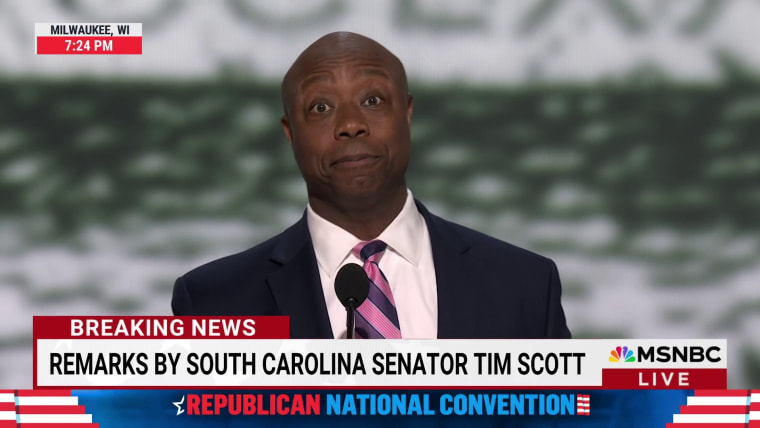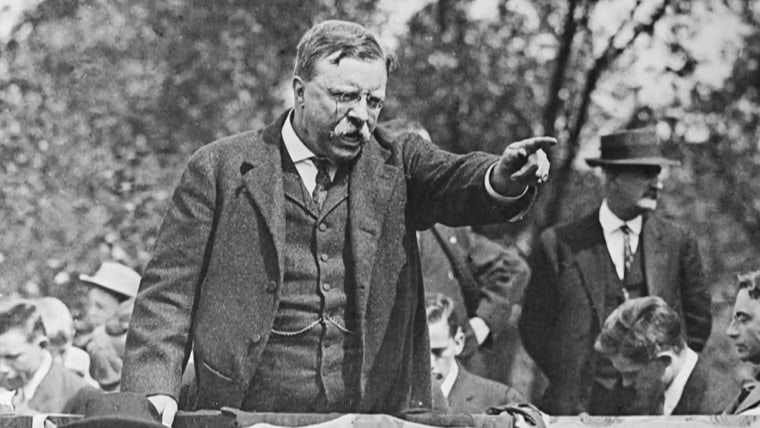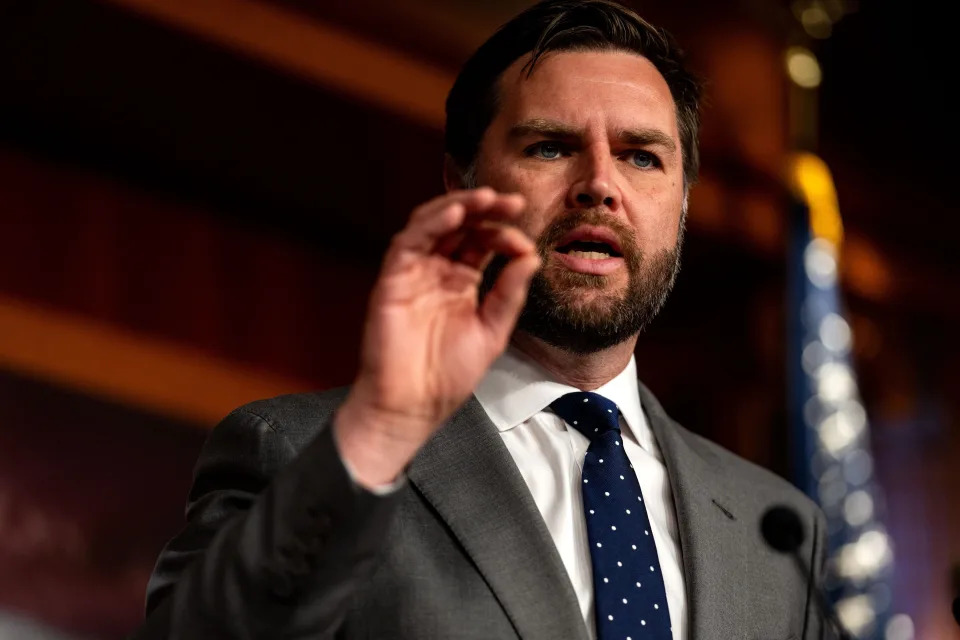MSNBC – Opinion
The worst thing about Ted Cruz’s dystopian RNC speech
From immigration to crime to fentanyl, stoking fear mattered a lot more than getting the facts right.
By Radley Balko, investigative journalist – July 18, 2024

Ted Cruz on the second day of the Republican National Convention in Milwaukee on Tuesday. Joe Raedle / Getty Images
If there’s one thing we’ve learned over the last nine years, it’s that when reality proves inconvenient for MAGA, MAGA simply creates its own reality. This was certainly true of Tuesday’s “Make America Safe Once Again” night at the Republican National Convention, at which the speaker’s podium was the rhetorical equivalent of a wrench-opened fire hydrant, as one speaker after another recklessly sprayed lies, fear and demagoguery in every direction.
Sen. Ted Cruz’s undiluted rage was particularly dishonest, and because it was Ted Cruz, it was as awkward as it was angry. His clumsy attempt to coax the crowd into a refrain of “every damn day” — a reference to how often he claimed that “teenagers, girls and boys” are raped, murdered and “sold into a life of sex slavery” because of “our open border” — mostly fell flat.
Sen. Ted Cruz’s undiluted rage was particularly dishonest, and because it was Ted Cruz, it was as awkward as it was angry.
There are, of course, some documented examples of horrific crimes committed by undocumented people, as there are with any demographic group that numbers in the millions. But on the whole, immigrants both legal and undocumented commit crimes (violent crimes, in particular) at rates lower — often much lower — than the native-born population.
The much-maligned “sanctuary cities” have lower crime rates than other cities. Cities that have been hospitable to migrants seeking asylum have seen less crime than other cities. Crime in most of those cities has dropped since they began receiving migrants from the most recent wave of immigration, including the cities where Republican governors have been shipping migrants.
If such gruesome crimes were really happening “every damn day,” you’d think Cruz, R-Texas, could find more a recent horror story than, for example, the death of Kate Steinle, who died, as Cruz put it, after a man who “had been deported five times” fired a bullet that “ripped through her heart.”
If that name sounds familiar, it’s because Donald Trump also mentioned Steinle in his acceptance speech at the 2016 RNC. Steinle died nine years ago, after a man named José Inez García Zárate found a gun wrapped in cloth under a bench on a pier in San Francisco.

Watch highlights from Night 2 of the Republican National Convention in 3 minutes. 03:05
It’s true that Zárate had been deported five times. He was also a felon, though for nonviolent drug crimes. The gun had been stolen from an agent with the Bureau of Land Management, who left it unsecured in his car. Zárate testified at his trial that the gun went off when he picked it up. Ballistics reports confirmed that the bullet ricocheted off a concrete block and struck and killed Steinle, who was 90 feet away. There is no evidence that he intentionally fired the gun, much less that he intended to kill Steinle. A jury acquitted him on all charges but one (being a felon in possession of a firearm), and that charge was later thrown out by a judge. He pleaded guilty to related federal charges in 2022 and was deported this year.
Steinle’s family has repeatedly asked politicians to stop politicizing her death. For politicians like Cruz, a family’s grief is legitimate only when it can be harnessed to hoover up votes.
Cruz also claimed that “Democrats cynically decided they wanted votes from illegals more than they wanted to protect our children,” reiterating the central claim of conspiracists who push the racist “great replacement theory.” There is, of course, no evidence that undocumented people vote in significant numbers, that there’s some coordinated campaign to get them to the polls or that voting plays any role in the Biden administration’s immigration policy. (There is also evidence that Biden has actually been tougher on illegal border crossers than Trump.)
Beyond immigration, speaker after speaker attempted to terrify viewers into the voting booth with claims about crime that have been disproven over and over again.
House Majority Leader Steve Scalise, R-La., repeated Trump’s brazen lie about other countries’ “emptying prisons” by sending their felons to the U.S. (Trump often includes “mental institutions” in his claim). There’s no evidence this is true. Ironically, it’s a line first used by Fidel Castro to denigrate refugees fleeing his communist regime and that Republicans today often use to slander Venezuelan migrants fleeing the socialist government of Nicolás Maduro.
Several speakers also repeated the tired claim that fentanyl has been flowing through the border because of the Biden administration’s lax enforcement.
According to data compiled by Dan Bier of the Cato Institute, just 2 of every 10,000 people caught trying to enter the country illegally possess any fentanyl at all. Over 90% of fentanyl seizures come at legal points of entry, and 86% of people convicted of smuggling the drug are U.S. citizens. Moreover, smuggling of fentanyl, which is easier to conceal and far more concentrated than other illicit drugs, actually increased during the Covid travel restrictions. The idea that Biden has been lax on border enforcement will come as a surprise to the immigrant advocates who are furious with him.
There’s also no evidence that progressive or reformist prosecution policies more broadly correlate with an increase in violent crime.
There’s also zero evidence that terrorists are traipsing across the southern border, as several speakers claimed. There has yet to be a single documented case of an American citizen killed or injured by a terrorist who illegally crossed the southern border, and since 1975 there have been only nine documented cases of any person’s ultimately being convicted of terrorism after illegally entering the country.
Beyond immigration, speaker after speaker attempted to terrify viewers into the voting booth with claims about crime that have been disproven over and over again. We heard much about “Soros-funded” prosecutors’ unleashing a wave of crime and violence on America’s cities. Florida Gov. Ron DeSantis lamented that these prosecutors “care more about coddling criminals than protecting their own communities” and that they “impose their will on us without our consent.”
This is a particularly rich accusation to come from DeSantis, who removed two prosecutors overwhelmingly elected (and re-elected) by their constituents and replaced them with the very sort of law-and-order prosecutors those voters had rejected. Though DeSantis accused the prosecutors of being “soft on crime,” there’s little evidence that crime has been higher in their districts than in similar districts around the state. There’s also no evidence that progressive or reformist prosecution policies more broadly correlate with an increase in violent crime.
Wisconsin GOP Senate candidate Eric Hovde claimed the Biden administration has “made us less safe at home with their ‘defund the police’ movement.”
That statement may be the most impressive lie-to-word-count ratio yet.

‘Humiliation parade’: DeSantis, Haley speak at RNC after Trump’s relentless attacks. 10:51
Biden didn’t support the “defund” movement; he was openly critical of it. The Biden administration hasn’t cut federal funding to law enforcement; it has increased it (sometimes over the objections of Republicans). In the two years after the George Floyd protests, 8 in 10 departments’ funding increased at least 2%. A handful of departments saw marginal cuts in funding, but no police department was “defunded.” There’s also zero evidence that more police funding corresponds with a reduction in crime or that less funding corresponds with an increase. (Otherwise, Hovde’s claim is accurate!)
Finally, here’s some context you didn’t hear: When Trump took office in 2017, he inherited the lowest murder rate of any president in half a century. He was then the first president in three decades to finish his term with a higher murder rate than when he started.
Trump isn’t to blame for all of that. He presided over a once-in-a-generation pandemic that disrupted black markets, took witnesses off the streets and brought a wave of desperation and despair. His term also included the largest civil rights protests in U.S. history, which only reinforced the (understandable) antipathy toward police in many marginalized communities.
Back in 2016, Trump and his surrogates blamed Obama for a surge in crime that never happened.
For the most part, presidents and their policies have little effect on crime. But there is some research suggesting that crime tends to go up when people see the government as corrupt, incompetent or hostile to their interests, particularly among marginalized groups. The theory here is that when people lose faith in government, they’re less likely to cooperate with state institutions like police and the courts. And it seems safe to say that from 2017 to 2021 there was ample reason to see the government as corrupt, incompetent and discriminatory. Immigrants, in particular, were less likely to report crimes and cooperate with police during the Trump years, most likely out of fear that they or their families would be subjected to immigration investigations.
All of that having been said, most of what drove the surge in crime was beyond Trump’s control. But this isn’t a courtesy Trump has given his opponents.
Back in 2016, Trump and his surrogates blamed Barack Obama for a surge in crime that never happened. They’re now doing the same thing to Biden. So it only seems fair to point out that the only major surge in crime in 40 years occurred while Trump was in the White House.
There is at least one class of crimes that has increased exponentially since Biden took office: crimes committed by former presidents. But that probably isn’t a trend the RNC wants to emphasize.










